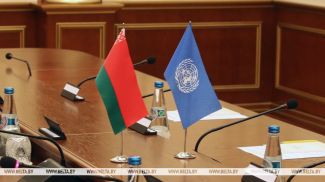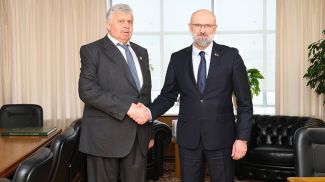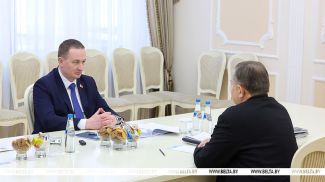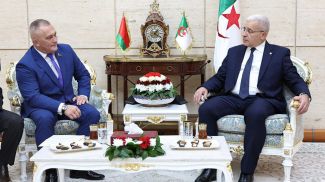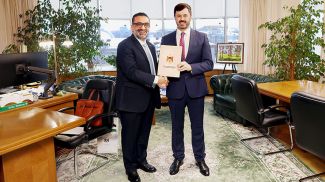The diplomatic service has made an important contribution to the formation of Belarusian statehood. Our country is building up cooperation with foreign states and is forging partnerships with like-minded countries using its multi-vector approach, the principle of good neighborliness and taking into consideration national interests. In the run-up to the 100th anniversary of the diplomatic service, Belarusian Minister of Foreign Affairs Vladimir Makei gave an interview to BelTA. He spoke about the history of Belarusian diplomacy, the way Belarus managed to secure a foothold on new markets and turn into a driver of integration projects in Eurasia and a place to settle Europe's burning issues and a donor of European security.
Mr Makei, Belarus will mark Diplomat's Day on 22 January for the first time. This year the country also marks the 100th anniversary of the Belarusian diplomatic service. This is a good opportunity to take stock of the work of the foreign ministry. What are the key milestones in the history of the foreign ministry? What things are you proud of and what things do you regret?
Answering your question, I would like to start from the very beginning, the time when the Belarusian state was proclaimed. In 1919 the Constitution of the Socialist Soviet Republic of Byelorussia, in the chapter dedicated to the government and the Council of People's Commissars, read: “The following people's commissariats shall be established: 1) commissariat for foreign affairs, 2) commissariat for military affairs, 3) commissariat for internal affairs, 4) justice commissariat…” – a total of 15 commissariats. The order in which the commissariats were listed attests to the priority given to each of them. International recognition, determination of borders and return of refugees were the first-priority tasks for the fledging state. These tasks and some other matters were handled by the Commissariat for Foreign Affairs.
The next milestone dates back to August 1921 when the first provision related to the People's Commissariat for Foreign Affairs of the BSSR was passed. From 1919 to 1923 the staff of the commissariat greatly varied and featured from 12 to 40 employees. In November 1923 the commissariat was reorganized into the office of the commissioner of the USSR people's commissariat at the BSSR government. This agency assumed foreign policy functions.
The Byelorussian Soviet Socialist Republic signed 9 multilateral and 3 bilateral agreements before it joined the USSR.
The People's Commissariat for Foreign Affairs of the BSSR was established on 24 March 1944. It was led by Kuzma Kiselev who made an invaluable contribution to the formation and development of the Belarusian diplomatic service. We are proud of the fact that he signed the UN Charter on behalf of the BSSR, one of the UN founding members.
Since then we have gone a long way. This way was not smooth. Today we proudly say that the diplomatic service has made an important contribution to the rise of Belarusian statehood. Belarus' major achievement in the past three decades is asserting itself as an independent and sovereign state. Our country is a full-fledged member of the global community and pursues an independent foreign policy. This is our common achievement and our greatest value.
A pragmatic multi-vector policy earned Belarus more allies and foreign partners. It helped discover new promising markets and secure a foothold there. Our country has become one of the drivers of integration projects in Eurasia, a place to resolve pressing issues in the European region and a donor of security, in Europe at least.
It is noteworthy that although Belarus is a relatively small state, it is not a bystander on the global arena. Quite the opposite, we definitely have a say in international relations. We put forward and consistently implement ambitious initiatives. The biggest of them is launching an inclusive and strategic dialogue aimed at overcoming disagreements in the Euro-Atlantic region and Eurasia.
Although we have succeeded in several areas, we would like to see bigger progress in some other matters. We are working hard on it, including together with our foreign partners, because diplomacy is about dialogue and joint search for solutions, first of all.
Does today's Ministry of Foreign Affairs make use of the expertise and knowledge of Belarusian diplomacy veterans, those who established traditions and raised a young generation of diplomats?
The diplomacy is probably one of the most objective markers of the statehood development, as it is an instrument of communication with the external world aimed at defending and promoting national interests. In this sense it is evolving hand in hand with the state.
As we have already said, Belarus is internationally known as a peaceful state, an active member of international relations, and a predictable and reliable partner. Belarusian products sell well abroad; foreign states are interested in promoting multifaceted cooperation with Belarus. This is the result of the painstaking work of today's and the previous generations of diplomats. This experience is unique and precious, because it serves the basis for the formation and development of the Belarusian diplomatic service.
Transfer of experience is the key to effective work of the Ministry of Foreign Affairs. We try to make the most of the experience of our senior co-workers. Many retired diplomats play an active role in the association of veterans of the Ministry of Foreign Affairs and also assist in the preparations to celebrate 100 years of the Belarusian diplomatic service.
The ministry has established a practice when young employees are mentored by experienced diplomats, has developed and applies a corresponding set of tools. For example, we annually hold a workshop for young diplomats and specialists which is attended by senior co-workers.
The importance of transfer of day-to-day experience is due to the specifics of the diplomatic work that requires maintenance and development of a large number of working contacts. The transfer of such contacts plays a key role in the rotation of diplomats.
The Ministry of Foreign Affairs' heraldic symbols and uniforms of ambassadors were established last year. How important is it for those in the diplomatic service, and when will we see Belarusian ambassadors in uniform?
The establishment of a system of official heraldic symbols of the Belarusian diplomatic service is one of the steps aimed at the further strengthening of the Belarusian diplomacy.
For any public service, including diplomatic, the recognition of its contribution to the development of a country is of great importance. The social status and moral standards of a diplomat are also important. We see the further strengthening of the moral component, the spirit, so to say, of the Belarusian diplomatic service as an integral element of efforts to develop the national school of diplomacy.
One of the most effective forms to manifest cohesion and esprit de corps are the external distinctive signs that indicate the belonging to a particular public service.
I would add that despite the deceptive external gloss of this profession, the work of a diplomat is about the highest professional qualifications, sometimes extreme workload and psychological stress, great responsibility. The heraldic symbols reward the merit and service to the state and society of the Ministry of Foreign Affairs personnel who dedicate themselves to the service to the Motherland. The symbols are also designed to maintain high moral and ethical standards of the ministry's employees and cultivate patriotism in them, preserve the continuity of generations of Belarusian diplomacy, and enhance the prestige of the diplomatic service.
As for the new uniform of ambassadors, the work is underway. The uniform design has been approved by the head of state. The project has involved the country's best designers who drew on the centuries-old traditions of the country and the Slutsk belt ornaments.
Very soon the Belarusian ambassadors will appear in the credentials ceremonies wearing new uniforms, of course, if a local protocol allows it.
Not long ago the Ministry of Foreign Affairs went through optimization. It is painful for any team, bearing in mind that the number of assigned tasks increases. How did this process go, and did it affect the quality of the work of the ministry and the embassies? What kinds of specialists does the ministry still need? Is there a desire to reconsider approaches to the personnel policy?
A large-scale optimization of the system of government bodies, including the diplomatic service was carried out in 2017-2018 following the instructions of the head of state. The staff numbers of the central office of the ministry and the Belarusian diplomatic missions were reduced. The workload and stringent requirements for each diplomat increased manifold.
It is no secret that any downsizing is not an easy process as it directly affects workers and their families. We have built a system-based work in this area. We apply an individual approach and provide every person we dismissed with the right to be included in the ministry's reserve pool.
Optimization is not about just downsizing. We have refocused on the most important areas of work, from the point of view of national interests, increased the personnel numbers of some foreign institutions. We opened the Consulate General in Dubai and transferred the Belarusian embassy from Ethiopia to Kenya. Those were the instructions of the head of state. The development of a fundamentally new structure of the ministry also contributed to its better functioning.
The results achieved by the Ministry of Foreign Affairs in 2018 convincingly demonstrate that after the optimization the ministry is ready to address all the tasks assigned to the Ministry of Foreign Affairs.
It would be not very diplomatic to ask you about the top five or top ten partners of our country... I will put the question this way. In your opinion, how many friends Belarus has? Do we have enemies?
A famous aphorism comes to mind. In politics there are no eternal allies, no permanent enemies, just interests. The concept of friends and enemies is also debatable. We have partners on the international arena.
Our country's foreign policy and foreign trade policy, like any other, are based on national interests. Its main principles and priorities were defined by the country's president. These include a multi-vector policy, good neighborliness, peacefulness. From this perspective we build up relations with foreign states expanding the circle of our partners and allies.
Today Belarus has built constructive political and mutually beneficial economic relations with most countries of the world on all continents. We seek to optimize and balance our interests between different poles of power. Belarus is open to cooperation with all partners who are ready to engage in a dialogue based on the principles of equality and mutual accommodation.
Having set the foreign policy priorities, we have been working on their content. Cooperation with our key partners, which are neighboring countries, including Russia, CIS states, does not contradict the efforts to build pragmatic relations with the European Union, the United States, the states of the distant arc. This work will be continued.
What else should Belarus do, in your opinion, to diversify exports, achieve a sustainable surplus in foreign trade? How successful was this work in the past year, and what are the prospects?
We won't do without figures here. Let's turn to the statistics. In January-November of last year, Belarus' foreign trade rose by 15.7% to reach $75.7 billion. We had a surplus of $782.6 million in trade in goods and services.
Belarus still runs a merchandise trade deficit, mainly due to the high cost of energy resources our economy needs. So the solution to the problem of the merchandise trade deficit lies with all industries and sectors of the national economy.
To reach a sustainable surplus in foreign trade we need to build up exports of goods and increase the share of services, make the most of transit opportunities, logistics, tourism, and education potential of the country. For this purpose we need to invest more in the services infrastructure, improve the state regulation in these sectors.
Foreign trade results mirror the structure of our economy, industry. The Belarusian export diversification program should rely on the relevant production base. First of all, this is industrial diversification, the production of new competitive high-tech goods which the Ministry of Foreign Affairs and foreign institutions will be able to promote, together with the producers, in foreign markets and thereby increase exports and ensure a trade surplus.
Last year, we made some progress. Merchandise exports in January-November totaled $30.8 billion, which was an increase of $4.4 billion, or 16.5% year-on-year. Exports increased both in value terms and in physical terms.
Positive dynamics in the structure of commodity exports is coupled with the positive developments in the export geography. We seek to have our trade equally distributed between the Eurasian Economic Union, the European Union and other countries. This is the goal we have been gradually moving towards. In January-November the EU accounted for 31% in Belarus' total exports. A year ago, the figure for the same period stood at 26%. The share of Russia, on the contrary, decreased from 45% in 2017 to 38% last past year.
These indicators are encouraging, but we should admit that there is still a lot of work ahead in terms of export diversification. (Everyone should get involved in this work, including the Ministry of Foreign Affairs, relevant ministries, regional authorities and manufacturers.
In January-November of last year Belarus exported its products to 177 countries, including 18 new destinations (South Sudan, Andorra, Equatorial Guinea, Laos, Palestine, and others). Belarus branched out with its traditional export goods to new markets: with potash fertilizers into Mozambique, El Salvador, Cambodia, Laos, with tractors and tractor units into Ireland, Cambodia, Canada, India, with sawn timber into Croatia, Morocco, and Saudi Arabia.
In this context, I would like to mention the systematic work within the framework of the Eurasian Economic Union to advance into the markets of the distant arc countries. Free trade agreements (FTA) between the EAEU and third countries open up new opportunities for Belarus to diversify export of goods and services, to bolster industrial and agricultural ties, and to raise investments.
The EAEU is in active talks over FTA with Singapore, Israel and India, and over the harmonization of the trade regime with Serbia. The first round of talks with Egypt was held in January 2019.
On the initiative of the Ministry of Foreign Affairs, the Belarusian government approved the so-called second package of countries with which it is advisable to begin FTA negotiations in the next two to three years. This list includes the countries the cooperation with which holds great promise from an economic point of view.
The Ministry of Foreign Affairs will continue the work to fulfill the goals set forth by the country's leadership to develop and diversify export and to expand its geography. For these purposes we will use all the necessary tools and mechanisms, both internally and externally, in bilateral and multilateral formats. Together with the government, ministries, departments, and manufacturers we will continue to promote the national interests in foreign trade for the benefit of the Belarusian state and its citizens.
What are the most important events for Belarus in 2019, in your opinion?
I think the European Games will become the event of the year for our country. Minsk and the rest of Belarus will welcome a lot of guests from Europe and other regions of the world. The games will be a great, exciting and memorable event. All government bodies including the Ministry of Foreign Affairs are preparing for it. For example, at the end of last year we took representatives of the accredited diplomatic corps to visit the Belarusian rhythmic gymnastics center. It was not that we spilled all our beans. We just gave them a glimpse into our sport world. In general, we have created good conditions for our guests, and as you know, we have launched the 30-day visa waiver for visitors from 74 countries who come to Belarus via Minsk National Airport.
At present, the Ministry of Foreign Affairs is actively working on the organization of a whole range of bilateral visits, including those at the high- and highest level. Some of them will be held for the first time. Before every visit we analyze the promising cooperation topics and also the issues in need of solution. The focus is on economy. In view of this analysis, I can say that the talks will be intensive and will bring tangible results.
We will see the events related to the initiatives promoted by Belarus at the global and regional level. Among them is the launch of a dialogue on improving regional security, ‘partnership of integrations', settlement of the situation in Ukraine, anti-terrorism.
We plan to support the idea of organizing forums and meetings of experts in Minsk to analyze security threats and work out crisis management plans. Belarus has already become a unique country in this respect. Many representatives of foreign countries say that Minsk is a convenient neutral international site to discuss the most complex regional and global issues in various formats. We want to raise the level of such discussions and their practical value in political decision-making.
Alina Grishkevich
BelTA





